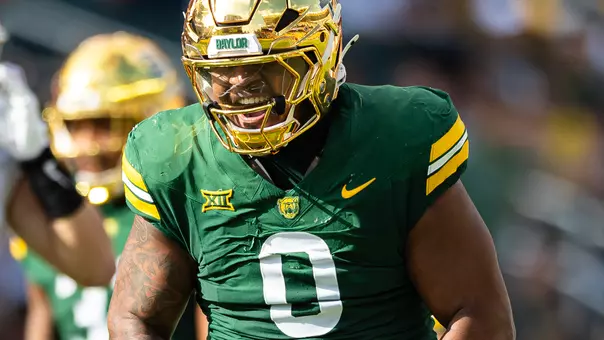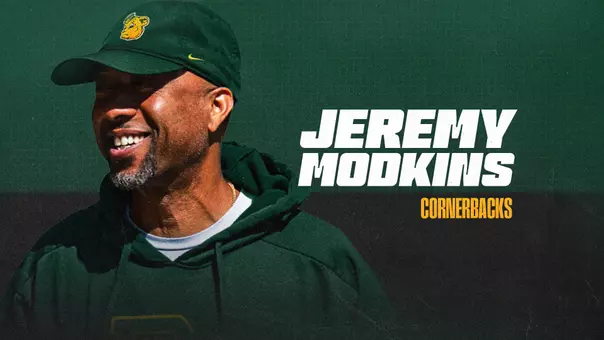Dave Campbell: A Closer Look at Dave Baldwin
3/13/2002 12:00:00 AM | Football
March 13, 2002
Editor's Note: Dave Campbell's column appears in each edition of the Baylor Bear Insider Report, available upon membership in the Baylor Bear Foundation. For information on joining the Bear Foundation, click here.
Dave Baldwin, a proven architect of high octane football both on the west coast and in the Ohio River valley and a former head coach himself, was chosen over the offseason by Baylor coach Kevin Steele to be the Bears' new offensive guru.
His official title: Offensive coordinator and quarterbacks coach.
Baldwin, who is 46 years old, is making the move to Waco after serving one year as offensive coordinator at U. of Cincinnati where he helped engineer the Bearcats to a 7-5 season and a trip to the Motor City Bowl although he had to design an offensive package that was quarterbacked by a freshman, Gino Guidugli.
Despite his tender years, Guidugli completed 58 percent of his passes, averaged more than 250 yards through the air, passed for 16 touchdowns and suffered only nine interceptions, and was named Conference USA Freshman of the Year.
Steele would welcome such production from Baylor's quarterback position, which has been an open wound since his arrival as head coach in 1999 and indeed for the better part of the past decade as the Bears have played under four different head coaches.
CINCINNATI'S OFFENSE finished in the top 40 nationally in total yards (416.3), scoring (29.1) and passing (269.8) although Baldwin was new on the job and the team had lost its starting quarterback, its leading receivers and its starting center from the year before.
After beating Army, Tulane, Alabama-Birmingham, Houston, Connecticut, Memphis and Louisiana-Monroe in regular season play, the Bearcats lost their bowl game to favored Toledo (ranked No. 25 nationally), 23-16.
Baldwin had similar success at San Jose State, where he was head coach for four seasons (1997-2000). His 2000 team finished in the top 30 nationally in total yards (417.3), scoring (31.2) and rushing (189.1) while compiling a 7-5 record and recording victories over both Stanford and then-ranked No. 9 TCU, which was undefeated at the time and boasting a nation's-best 12-game winning streak.
The year before, San Jose State defeated a Stanford team that went on to win the Pac 10 and go to the Rose Bowl. Actually, San Jose State beat Stanford three years in a row during Baldwin's tenure, a signal achievement considering the disparity in football budget, facilities, talent and reputation. In 1997, his team beat No. 24-ranked Air Force.
His team's 7-5 mark in 2000 was San Jose's best record since 1992.
"When I was at San Jose, we took over a program that had 53 scholarships and had not won," Baldwin said. "We put a lot of effort into building it up, and they offered me a new contract there (after the 2000 season) but I didn't see the direction of football there as the direction I wanted to go."
Hence the move to Cincinnati, which became a stepping stone on his road to Baylor.
"I REALLY BELIEVE there's talent here (at Baylor)," he said. "I've seen the quarterbacks, the offensive linemen (on tape). You don't have to have the best talent to win. What you have to have are 11 guys working together, and don't turn the ball over."
More music to Kevin Steele's ears.
When Steele first began his search for the man he wanted to succeed Greg Meyer as offensive coordinator at Baylor, he said he wanted someone who had proven himself not at just one school but several.
"I talked to a number of NFL head coaches and coordinators about who would be the best man for the job, and I talked to some top college coaches to get their recommendations. And three names just kept coming up. So I researched all three in depth -- how it was before they took over the offense, how much they improved it, what happened after they left. I did it on every guy, and then I compared them, compared the figures. And nobody else consistently produced the numbers that Dave Baldwin did.
"Also, I was intrigued by what I heard about him and his quarterbacks. Everybody was just so positive about the way he coaches quarterbacks.
"HE HAS TAKEN the talent pool at different places and molded it to his philosophy. He has been a head coach who also has run the offense, been the play-caller for a long time. I wanted someone who could take our offense and give us some direction. I feel very comfortable that he will take our talent pool on offense and progress with it very nicely.
"And he's going to run the offense. I don't intend to be a backseat driver," Steele said.
He said Baldwin has called plays both from the sidelines and upstairs from the coaches' booth, "but he said he prefers to be upstairs during the game, and I imagine that's where he'll be."
Before taking the reins at San Jose State, Baldwin headed up the football program at Cal State Northridge, Santa Rosa Junior College in California and Santa Barbara Junior College. He was named juco region III coach of the year in 1991 after guiding his team to a 9-2 record. In his first year at Santa Rosa (1994) he guided his team to an 8-3 record.
Earlier, he was wide receivers coach at Stanford from 1984-88 and at San Jose State from 1980-83. In his final year at Stanford he was named passing game coordinator.
He began his coaching career in 1978 as a high school assistant at Granada Hills (Calif.), where earlier he had quarterbacked the team, and from there he went to Cal State Northridge, his college alma mater, as a graduate assistant in 1979.
It was at Northridge that Baldwin first came under the tutelage of Jack Elway (NFL Hall of Fame quarterback John Elway's father), and he was to spend 11 years as an assistant under Elway -- at Northridge, San Jose State and Stanford. "Jack Elway has kind of been his mentor," said Steele.
BALDWIN CLAIMS no stardom as a player himself. "I was so slow it looked like I was toting a piano," he joked in a meeting with media representatives at Baylor last Friday. "I like to tell the story that coach Elway ran the veer until I graduated and then he went to the passing game."
And it is that passing game that will be the bedrock of Baylor's offense in the immediate future. "We're going to have a spread offense and be as multiple as we can be," he said.
Yes, he said, in reply to a question, "We incorporated a tight end in our offense and used a tight end, and I expect to do so here. I think you have to use everything in your arsenal. We also have used four and five wide receivers and no backs at different times."
But he also made it plain that he firmly believes the ability to run the football is vital for consistent success, and in 2000 his offense at San Jose State featured Deonce Whitaker, who became a Doak Walker Award semifinalist. That is the award that goes annually to major college football's top running back.
"I really believe the spread (offense) is an advantage because you're taking the great athletes (on defense) and moving them outside the box," he said.
As for Baylor, "I'm excited about the opportunity to be a part of something special here. I didn't find Kevin (Steele), he found me. And then I did some research on him. I don't think I could work for a better person than Kevin Steele. The three things that interested me the most about this job were Kevin Steele, the opportunity to coach in the Big 12 Conference -- probably the best conference in America -- and to be able to coach here in Texas, which has such a great football tradition. Football means something in this state.
"Kevin and his staff have laid a great foundation for success, and it will be fun to see the final pieces come together."
Baldwin said he expects to be involved in recruiting. "I like to recruit -- very much so. I like to go into high schools and meet the coaches," he said.
He and his wife, Kathy, have been married for 23 years and have three children -- son Sean who is 22, son Ryan who is 17, and daughter Keiley who is 14.



















